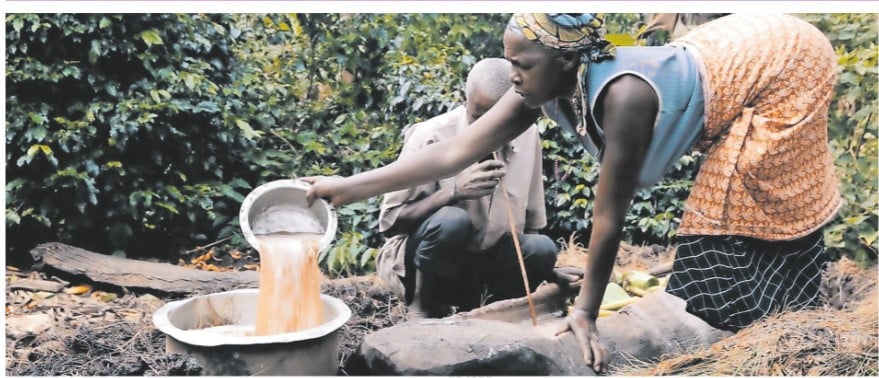Film on local banana beer intoxicates fans

A screen grab of a woman scooping tonto beer from a wooden boat while a man tastes the beer in the documentary The Tonto Masters of Kainamo. Tonto is very popular in western and central Uganda—the main banana growing areas where it is used during traditional marriage and burial ceremonies, merrymaking events and sometimes as medicine. PHOTOS/COURTESY/ BAMUTURAKI MUSINGUZI
What you need to know:
- Set in the heart of Kainamo Village, Bushenyi, southwestern Uganda, The Tonto Masters of Kainamo captures the fading art of brewing tonto, a cherished tradition among the Banyankole people
A 2022 Ugandan documentary film on the tradition of making fermented banana beer titled The Tonto Masters of Kainamo has made its worldwide premiere on the Kenyan Digital Cinema Extension, MyMovies.Africa.
Set in the heart of Kainamo Village, Bushenyi, southwestern Uganda, the film captures the fading art of brewing tonto, a cherished tradition among the Banyankole people.
The art of brewing tonto is more than just a craft, it’s a way of life. Yet this craft that is passed down through generations now hangs by a thread.
The 22-minute documentary produced by Quipster Studio takes the viewer on an intimate journey into the meticulous process of crafting tonto.
The journey straddles from ripening the bananas in a carefully prepared pit to the final fermentation in wooden boats. This meticulous process has withstood the test of time.
As modernisation threatens to erase these age-old techniques, the film showcases the delicate balance between cultural preservation and progress. Will these age-old techniques survive, or will they be lost forever?
Directed by Kahangye Kagwa, the documentary is narrated by Leonard Nsaba Mafara, with Francis Kiiza demonstrating the brewing process.
“I feel very honoured, excited and humbled at the same time to know that my film, Tonto Masters of Kainamo is showing on MyMovies.Africa,” Kagwa told Saturday Monitor.
When asked how the public has received this film, Kagwa, who is also the director of Quipster Studio, replied: “The film was nominated for Best Documentary in the Uganda Film Festival in 2022, and has been well received due to its African cultural theme that explores the process of traditional banana beer brewing, which we call tonto in Runyankole.”
About what influenced him to make the film, Kagwa, for one, points to the “passion I have for the Ankole culture and traditions.” He adds: “I was born a full African and my father never gave me a White man’s name.” Kagwa, who was raised in Kampala, said his father “always sent me to the village in December almost every year.” While in the countryside, he watched his late grandfather make a living out of brewing tonto.
“…as a child, I would enjoy peeling the yellow bananas and also eat some. And when the juice was squeezed out, swenkuru (grandfather) always made sure my aunties kept for me a full jug,” Kagwa disclosed, adding: “The process always brought family members and neighbours together for fun and laughter.”
Fresh beginnings
When Kagwa relocated from Kampala to his village to start up a coffee farm, he struck a friendship with the family of Kiiza.
“Some of his sons would help me with my gardening, and from them I got to know about their home business, which was simply about making tonto and selling it in order to cater for their family financial needs. It was kind of nostalgic and I felt the desire to pick up a camera and document their story,” he revealed.
On how he went about making this film, Kagwa said: “It all started with requesting Kiiza if he would accept me to film him and his family, to which he consented. I asked him briefly to explain to me the process and number of days it takes to brew tonto. I took notes and I asked him to inform his children to call me whenever they are doing a particular process so I could film and keep compiling the footage.”
“I had only one camera, a Canon 6d, one lapel mic, one on-camera LED video light and a colleague came in later to handle the drone shots. We filmed for six days and then sat down and did the editing and narrations. That is how the film was born,” he added.
Trushna Buddhdev-Patel, a co-founder, chief executive officer and content director of Yakwetu, the maker of MyMovies.Africa, said it is vitally important to preserve African traditions passed down through generations.
“We are dedicated to making this film available worldwide to raise awareness,” he said.
Using proprietary technology, MyMovies.Africa has a new request screening feature. The feature allows institutions like museums, universities, colleges and schools anywhere in the world to self-serve a screening of such important documentaries offline to groups of various sizes. The content is encrypted against piracy instead of sending an unprotected MP4. Request screening was first commercially tested with Mavuno Church in Uganda, during Good Friday 2024, with a screening of Where the River Divides.
“We hope that universities, colleges, schools, government offices and non-governmental organisations in Uganda, and the Diaspora, will screen The Tonto Masters of Kainamo as a conversation-starter about the importance of such cultural preservation in Uganda and Africa”, Mike Strano, a co-founder and chief operations officer of Yakwetu, said.
“The film is also available to rent or own by Ugandans and Africans at home and abroad, in local currency and other methods, on MyMovies.Africa. Proceeds go to the filmmakers so they can continue telling such important stories,” Strano added.
Meaning both “Of Us” and “For Us” in Kiswahili (the most popular African language), Yakwetu is an online home entertainment and edutainment system - of Africa, for Africa.
Using their proprietary Kenyan-made applications, Yakwetu is an online retailer and distributor of digital content through a range of thoughtfully curated branded services that supply consumers with securely encrypted original titles. It pays the creators, said Strano, “fairly” unlike pirated alternatives.
The making of tonto
Thanks to it, tonto, a Ugandan traditional fermented banana beer, is now being beamed to the world. Banana beer, which is one of the oldest and major alcoholic beverages in East Africa, is traditionally made from fermented mashed sour bananas (musa spp) mixed with sorghum.
The banana juice is extracted by men who stomp the peeled ripe sour bananas with their bare feet hence the other name mwenge bigere (feet beer in Luganda). The juice is then filtered and mixed with ground and roasted sorghum. This mixture is fermented in a wooden boat buried in a pit for two to four days. The alcoholic drink can only be served after fermentation.
Tonto is very popular in western and central Uganda—the main banana growing areas where it is used during traditional marriage and burial ceremonies, merrymaking events and sometimes as medicine.
Banana beer is known as urwagwa in Rwanda, isongo in Burundi and, kasiksi in the Democratic Republic of the Congo, urwaga in Kenya and mbege in Tanzania.
Kagwa has identified global warming, deforestation and modern drinks as the biggest threats to tonto.
“In a few years to come, this drink, tonto, may become extinct. The biggest threat is, one, change in climate (global warming) has made particular banana species called embiire and kayinja (musa acuminata) to start disappearing due to banana wilt disease attacks,” Kagwa noted.
“Deforestation too is a threat that I have noticed. Some tonto brewers are opting to squeeze the bananas in a plastic tarpaulin, put in a ground pit, which is a health risk as plastic residues end up in the drink. This is because they can no longer find native giant tree logs to shape out the traditional boats,” he added.
He said: “The advance of the packaged drinks in plastic bottles laden with chemical preservatives as alternatives to the traditional tonto drink creates unfair competition, which may knock the tonto brewers out of business and they may abandon the craft.”
Asked about the biggest threat to Uganda’s traditional cultural practices, Kagwa said: “No doubt it is the advance of modernity and neo-colonialism in a cultural sense, educated people are losing their traditional roots at a terrible rate and their children are worse off, they have even lost their mother tongues.”




